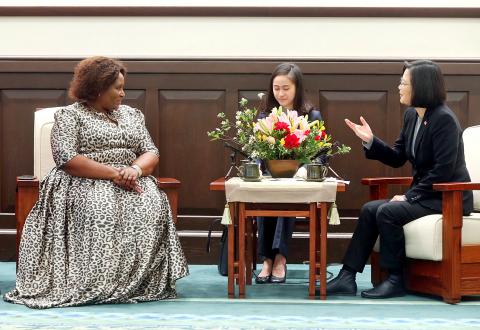President Tsai Ing-wen (蔡英文) yesterday pledged to explore new cooperation with Taiwan’s sole African diplomatic ally, the Kingdom of Eswatini, as she met with the country’s first female foreign minister.
Swazi Minister of Foreign Affairs and International Cooperation Thulisile Dladla, who arrived in Taiwan on Sunday for a five-day visit, met with Tsai at the Presidential Office Building in Taipei yesterday morning.
“Being of the female gender myself, I fully understand what a remarkable achievement it is,” Tsai said in a speech, referring to Dladla’s inauguration as Eswatini’s first female foreign minister in November last year.

Photo: CNA
Tsai, who was sworn in as Taiwan’s first female president in May 2016, said that she believed under Dladla’s leadership the friendship and partnership between Taiwan and eSwatini would become closer than ever.
Despite the geographical distance between the two nations, Taiwan and Eswatini see no obstacles in their friendship, Tsai said, adding that the two governments would not only make an effort to maintain existing partnerships, they would also seek to explore new ones.
Recounting her visit to Eswatini in April last year to celebrate the 50th anniversary of the independence of the African country and the establishment of diplomatic ties between Taiwan and Eswatini, Tsai said that the energetic Swazi culture left a lasting impression on her.
“During the visit, I also witnessed the fruits of our bilateral cooperation in medicine, education and trade,” Tsai said.
In addition to technical cooperation, she said she hoped to see more Taiwanese businesspeople use Eswatini as a base to enter Africa, which would create an environment of mutual reciprocity and mutual assistance.
Eswatini became Taiwan’s only African diplomatic ally after Burkina Faso severed ties and switched recognition to Beijing in May last year.
Taiwan has lost four other diplomat allies to China since Tsai’s inauguration: El Salvador; Sao Tome and Principe; Panama; and the Dominican Republic.
Amid speculation about his country potentially switching recognition to China, Swazi King Mswati III visited Taiwan in June last year and has repeatedly pledged his country’s loyalty to Taiwan.

CHAOS: Iranians took to the streets playing celebratory music after reports of Khamenei’s death on Saturday, while mourners also gathered in Tehran yesterday Iranian Supreme Leader Ayatollah Ali Khamenei was killed in a major attack on Iran launched by Israel and the US, throwing the future of the Islamic republic into doubt and raising the risk of regional instability. Iranian state television and the state-run IRNA news agency announced the 86-year-old’s death early yesterday. US President Donald Trump said it gave Iranians their “greatest chance” to “take back” their country. The announcements came after a joint US and Israeli aerial bombardment that targeted Iranian military and governmental sites. Trump said the “heavy and pinpoint bombing” would continue through the week or as long

TRUST: The KMT said it respected the US’ timing and considerations, and hoped it would continue to honor its commitments to helping Taiwan bolster its defenses and deterrence US President Donald Trump is delaying a multibillion-dollar arms sale to Taiwan to ensure his visit to Beijing is successful, a New York Times report said. The weapons sales package has stalled in the US Department of State, the report said, citing US officials it did not identify. The White House has told agencies not to push forward ahead of Trump’s meeting with Chinese President Xi Jinping (習近平), it said. The two last month held a phone call to discuss trade and geopolitical flashpoints ahead of the summit. Xi raised the Taiwan issue and urged the US to handle arms sales to

State-run CPC Corp, Taiwan (CPC, 台灣中油) yesterday said that it had confirmed on Saturday night with its liquefied natural gas (LNG) and crude oil suppliers that shipments are proceeding as scheduled and that domestic supplies remain unaffected. The CPC yesterday announced the gasoline and diesel prices will rise by NT$0.2 and NT$0.4 per liter, respectively, starting Monday, citing Middle East tensions and blizzards in the eastern United States. CPC also iterated it has been reducing the proportion of crude oil imports from the Middle East and diversifying its supply sources in the past few years in response to geopolitical risks, expanding

Pro-democracy media tycoon Jimmy Lai’s (黎智英) fraud conviction and prison sentence were yesterday overturned by a Hong Kong court, in a surprise legal decision that comes soon after Lai was jailed for 20 years on a separate national security charge. Judges Jeremy Poon (潘兆初), Anthea Pang (彭寶琴) and Derek Pang (彭偉昌) said in the judgement that they allowed the appeal from Lai, and another defendant in the case, to proceed, as a lower court judge had “erred.” “The Court of Appeal gave them leave to appeal against their conviction, allowed their appeals, quashed the convictions and set aside the sentences,” the judges